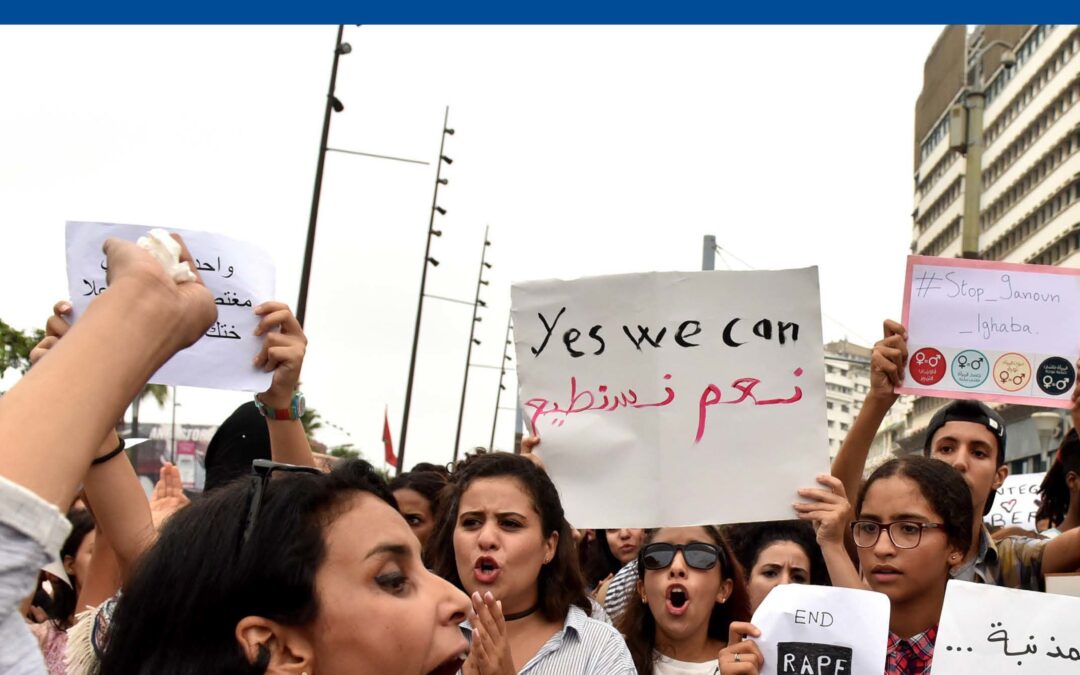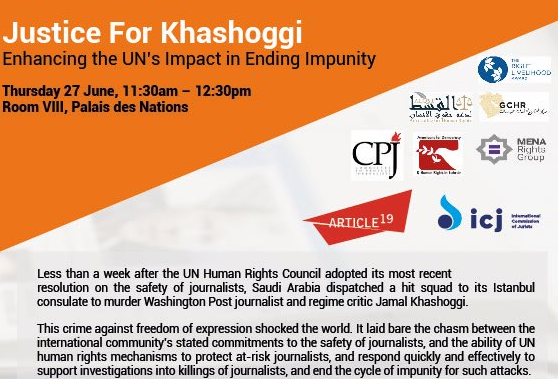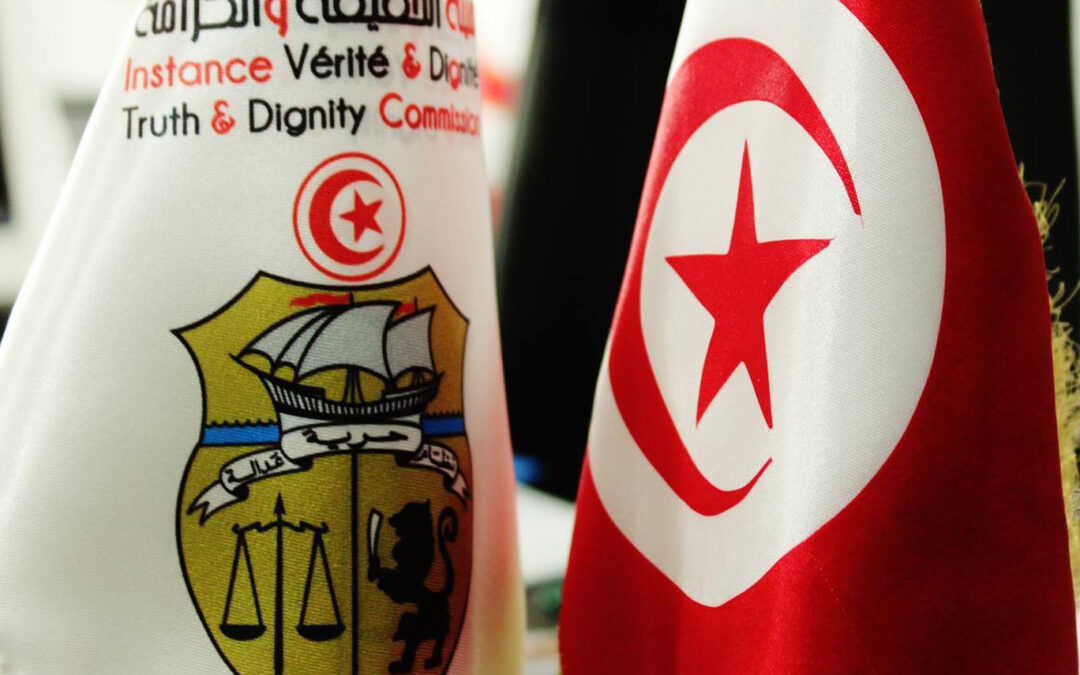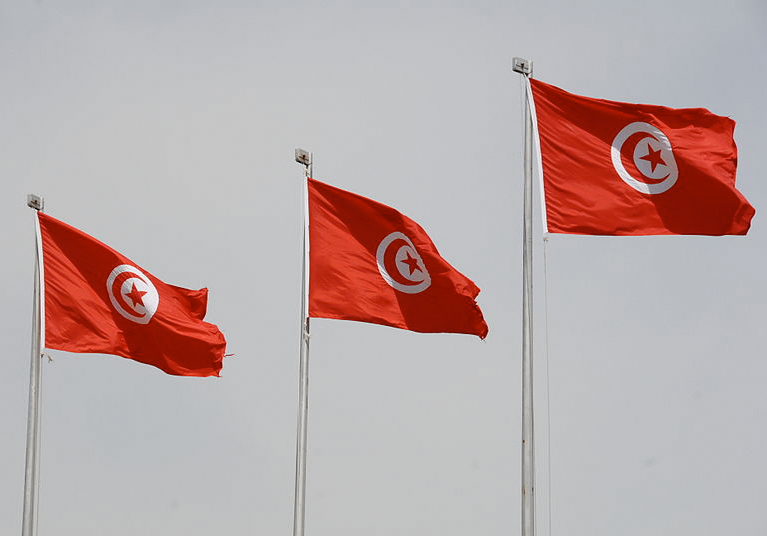
Jun 28, 2019 | Nouvelles, Publications, Rapports
Dans un rapport publié aujourd’hui à Rabat, la CIJ a appelé à l’élimination et à l’éradication des obstacles légaux et attitudes judiciaires discriminatoires entravant l’habilité des femmes et des jeunes filles à demander justice et réparation pour violences sexuelles et basées sur le genre au Maroc.
Le rapport de la CIJ Obstacles to Women’s and Girls’ Access to Justice for Gender-based Violence in Morocco (disponible en anglais et en arabe seulement) explore les différents obstacles auxquels sont confrontées les femmes qui cherchent à obtenir justice au Maroc, et adresse des recommandations au Gouvernement et au pouvoir judiciaire marocains afin d’améliorer l’accès à la justice et à des voies de recours utiles pour les femmes et jeunes filles victimes de violences sexuelles et basées sur le genre.
« Les autorités marocaines devraient modifier la Loi 103/03 et le Code Pénal afin d’assurer leur conformité au droit et aux normes internationales relatives aux droits de l’homme. Le parquet et les autorités judiciaires marocaines, dont le Conseil Supérieur du Pouvoir Judiciaire, devraient assurer que des directives détaillées concernant l’enquête et la poursuite des crimes de violences sexuelles et basées sur le genre soient développées et respectées, et que des programmes de sensibilisation soient déployés afin de lutter contre les stéréotypes de genre et le blâme des victimes dans les procédures judiciaires », a déclaré Saïd Benarbia, Directeur du Programme Moyen-Orient et Afrique du Nord de la CIJ.
Malgré la récente adoption de la Loi 103/03 relative à la lutte contre les violences envers les femmes, la violence sexuelle et basée sur le genre n’a pas encore été correctement adressée; elle reste très répandue au Maroc et nuit profondément aux droits des victimes et à la société dans son ensemble.
La Loi 103/03 ne définit pas le viol de manière conforme au droit et aux normes internationales pertinentes: le crime est encore considéré au regard de la moralité et de la décence publique, plutôt qu’en tant que violation de l’intégrité physique et de l’autonomie corporelle d’une personne; la Loi 103/13 est également une opportunité manquée de criminaliser le mariage précoce et d’un enfant, soutenant cette pratique néfaste.
En plus de lois et procédures discriminatoires, au Maroc, les femmes et jeunes filles cherchant à ce que justice leur soit rendue pour les violences sexuelles et basées sur le genre dont elles ont été victimes doivent faire face à un système judiciaire souvent influencé par des présomptions biaisées, et qui véhicule des stéréotypes de genre négatifs, dont des normes culturelles ancrées dans le patriarcat.
Dans ce contexte, comme analysé dans le rapport de la CIJ, des peines excessivement clémentes – par exemple dans les affaires de viol conjugal – et les risques accrus pour femmes et jeunes filles d’être poursuivies en justice sur la base de relations extra-conjugales consentantes dissuadent femmes et jeunes filles de demander justice et réparation pour abus physiques et sexuels dont elle ont été victimes soit des mains de leur époux soit d’individus auxquels elles ne sont pas mariées.
Afin de commencer à adresser les obstacles à l’accès à la justice rencontrés par les femmes et jeunes filles victimes de violences sexuelles et basées sur le genre, le rapport invite les autorités marocaines à :
- Adopter une législation qui reconnaît le droit individuel à l’autonomie sexuelle, et qui reconnait qu’une relation égalitaire exige le libre et entier consentement des deux parties ;
- Définir de manière adéquate et criminaliser dans toutes ses formes et selon une définition neutre sur le plan du genre les actes de viol, y compris en criminalisant le viol conjugal comme une infraction autonome ;
- Abroger l’article 490 du Code Pénal selon lequel les relations sexuelles extra-conjugales constituent une infraction pénale, et assurer que l’article 19 du Code de la Famille concernant l’âge minimal requis pour se marier soit strictement respecté ;
- Promulguer des politiques, mesures législatives et procédurales ayant pour but d’améliorer l’efficacité du système judiciaire ainsi que des autres services du secteur public liés à l’accès à la justice pour les femmes, y compris en faisant appliquer les décisions concernant les pensions alimentaires au conjoint ou aux enfants, en fournissant une assistance juridique gratuite pour les victimes de violences sexuelles et basées sur le genre, en octroyant des ordonnances de protection et en adoptant toutes autres mesures urgentes ;
- Développer et appliquer des directives portant sur l’enquête et la poursuite de crimes de violences sexuelles et basées sur le genre;
- Développer un protocole national relatif aux examens médicaux et médico-légaux dans des cas de violences sexuelles et basées sur le genre, et garantir un service d’analyses médico-légales disponible et abordable ;
- Fournir des programmes de formation et de sensibilisation visant à combattre, au sein du pouvoir judiciaire, les stéréotypes, le blâme des victimes et autres pratiques néfastes;
Informations supplémentaires
Cette semaine à Rabat, une délégation de la CIJ dirigée par la Commissaire Martine Comte a présenté le rapport à plusieurs autorités marocaines, ainsi que des acteurs de la justice et de la société civile afin de discuter de se conclusions et recommandations. La délégation de la CIJ a rencontré M. Mohamed Aujjar, Ministre de la Justice ; M. Taoufik El Maimouni, Président de la Commission Justice, Législation et Droits de l’Homme à la Chambre des députés ; M. Larbi Tabit, Secrétaire Général au Ministère de la Solidarité, de la Femme et du Développement Social ; Mme Amina Bouayach, Présidente du Conseil National des Droits de l’Homme ; ainsi que des représentants du pouvoir judiciaire et de la société civile.
Morocco-Obstacles GBV-Publications-Reports-Thematic report-2019-ENG (rapport en anglais, PDF)
Morocco-Obstacles GBV-Publications-Reports-Thematic report-2019-ARA (rapport en arabe, PDF)

Jun 23, 2019 | Events, News
The ICJ joins other NGOs and UN experts in presenting a side event to the UN Human Rights Council, Thursday 27 June, 11:30am – 12:30pm, in Room VIII, Palais des Nations
Less than a week after the UN Human Rights Council adopted its most recent resolution on the safety of journalists, Saudi Arabia dispatched a hit squad to its Istanbul consulate to murder Washington Post journalist and regime critic Jamal Khashoggi.
This crime against freedom of expression shocked the world. It laid bare the chasm between the international community’s stated commitments to the safety of journalists, and the ability of UN human rights mechanisms to protect at-risk journalists, and respond quickly and effectively to support investigations into killings of journalists, and end the cycle of impunity for such attacks.
This human rights crisis is not limited to autocratic countries or nascent democracies – after several years in decline, the number of killings of journalists worldwide spiked in 2018, whilst impunity for historic cases remains troublingly high, fueling further violence. In Malta, a report by PACE Special Rapporteur Pieter Omtzigt into the killing of Daphne Caruana Galizia more than 18 months ago, highlighted serious concerns over national investigations, pointing to systemic rule of law failings in the country.
As the UN Special Rapporteur on extrajudicial, arbitrary or summary executions, Dr. Agnès Callamard, presents the findings of her independent investigation into the killing of Jamal Khashoggi to the 41st Session of the UN Human Rights Council, join us to discuss what recent attacks on journalists have taught us about gaps in prevention, protection and prosecution, and how to enhance the UN’s response to impunity.
| Panelists |
Dr. Agnès Callamard |
UN Special Rapporteur on extrajudicial, summary or arbitrary executions |
|
David Kaye |
UN Special Rapporteur on freedom of opinion and expression |
|
Hatice Cengiz |
Fiancée of Jamal Khashoggi |
|
Pieter Omtzigt |
Special Rapporteur, Council of Europe |
|
Rob Mahoney |
Deputy Executive Director, Committee to Protect Journalists |
|
Yahya Assiri |
Founder and Director, ALQST |
| Moderator |
Thomas Hughes |
Executive Director, ARTICLE 19 |

Jun 7, 2019 | News
The ICJ today condemned the impending moves to subject three prominent Saudi clerics to an inevitably unfair trial on dubious charges that might result in sentences of death and arbitrary execution.
According to credible media reports citing Saudi government sources, Salman al-Odah, Ali Al-Omari and Awad al-Qarni, three prominent Saudi clerics, will almost certainly be convicted, sentenced to death and executed soon after Ramadan.
The media reports follow last April’s mass executions of 37 people, and the crucifixion of one them, following their conviction and sentencing to death for similar “terrorism” related charges.
The ICJ calls for the clerics’ release unless they can be charged with a recognizable criminal offence consistent with the rule of law, and tried before a competent, independent, and impartial court that ensures fair trial rights.
“Saudi Arabia is abusively resorting to terrorism related charges, unfair trials, and sentences of death followed by arbitrary execution to permanently silence perceived critical voices,” said Said Benarbia, the ICJ’s MENA Programme Director.
“Instead of perpetuating egregious violations of the right to life, Saudi authorities must administer justice fairly and in accordance with international law and standards,” he added.
One of the defendants, Salman al-Odah, was charged by prosecutors in September 2018 with 37 offences, including “belonging to a terrorist group: the Muslim Brotherhood,” “stirring public discord and inciting people against the ruler,” “calling for change in government,” “supporting Arab revolutions,” “possessing banned books” and “describing the Saudi government as a tyranny.”
The ICJ fears that Salman al-Odah may be subject to these charges simply for exercising his protected right to freedom of expression.
Together with the other two clerics, Salman al-Odah faces trial before the specialized criminal court, an exceptional court that fails to ensure respect of fair trial rights and that has been used to try those suspected of committing terrorism related offences, political activists, and human rights defenders.
The ICJ is concerned that since their arrest in September 2017, the clerics have allegedly been subject to incommunicado detention and prolonged solitary confinement for months. Such treatment amounts to torture or cruel, inhuman and degrading treatment, prohibited under international law.
Carrying out executions following proceedings that fail to scrupulously observe international fair trial standards always amounts to an arbitrary deprivation of life.
The ICJ opposes the use of the death penalty in all circumstances as a violation of the right to life and a form of cruel, inhuman and degrading punishment.
The ICJ underscores that the United Nations General Assembly, by an overwhelming majority, has repeated called on States that retain the death penalty to impose an immediate moratorium on executions with a view to abolition.
The ICJ calls on the Saudi authorities to immediately move toward abolishing the death penalty and impose an immediate moratorium on executions.
Background
The clerics’ detention and ongoing trial are part of a broader crackdown on activists and dissidents since September 2017, including through politicized judicial proceedings and trumped up charges under the 2014 Royal Decree.
The Decree criminalizes as terrorism offences acts that do not involve serious violence, including acts that aim to suspend the enforcement of the Constitution or some of its articles, as well as any acts that undermine the State’s prestige and standing.
Such broad definitions have effectively been used to criminalize the legitimate and peaceful exercise of human rights, including the rights to freedom of expression, association and assembly, and the right to take part in the conduct of public affairs.
The 2014 Royal Decree also allows the Minister of Interior to order the arrest of any person suspected of committing terrorism related offences, and for those arrested to remain in pre-trial detention for up to six months and to be prohibited from communicating with their family members for up to three months. Those arrested cannot be released pending trial without the authorization of the Minister of Interior or someone authorized by him.
Such conditions contravene international standards on the rights to liberty and to a fair trial.
Saudi Arabia-Death penalty-News-2019-ARA (Arabic version, in PDF)

May 29, 2019 | Communiqués de presse, Nouvelles
Un an après le début des travaux des chambres criminelles spécialisées en justice transitionnelle en Tunisie, les organisations de la Coalition pour la justice transitionnelle, dont la CIJ, déplorent aujourd’hui les nombreuses difficultés et contraintes subies par ces chambres, entravant ainsi leur fonctionnement normal et menaçant l’issue des affaires qu’elles traitent.
Les travaux des chambres criminelles spécialisées en justice transitionnelle ont démarré avec l’examen du dossier de M. Kamel Matmati le 29 Mai 2018 au Tribunal de 1ère Instance de Gabès.
Les organisations de la Coalition pour la justice transitionnelle organisent une série d’activités en commémoration de cette importante date dans l’histoire de la Tunisie tant elle est cruciale pour la révélation de la vérité, de la mémoire et de la lutte contre l’impunité.
Elles appellent ainsi les autorités tunisiennes à s’engager pour le suivi et l’application du processus de justice transitionnelle, le renforcement des chambres spécialisées et à leur protection institutionnelle.
Le communiqué a été signé par la CIJ avec d’autres organisations membres de la Coalition pour la justice transitionnelle.
Il peut être téléchargé ici:
Tunisia-CP Chambres Spécialisées-News-Press releases-2019-FRE (version française, PDF)
Tunisia-CP Chambres Spécialisées-News-Press releases-2019-ARA (version arabe, PDF)

Apr 29, 2019 | News
On 27 and 28 April 2019, the ICJ held a workshop on “Ensuring accountability through the Specialized Criminal Chambers” in coordination with the Association des Magistrats Tunisiens (AMT).
Participants in the workshop included 28 Tunisian judges attached to the Specialized Criminal Chambers (SCC).
The workshop aimed to reinforce the capacity of SCC judges to effectively exercise their role in adjudicating crimes under international law, in line with international law and standards.
ICJ legal advisers and Tunisian experts gave presentations on State the obligations of State actors to respect and apply international law, the legal framework governing the application of international law in Tunisia, and the principle of legality and statutory limitations to crimes under international law. They also spoke on the international and domestic definitions of crimes under international law and modes of liability.
Through working group and plenary sessions, the participants discussed options for applying international law and standards at the national level.
Expert speakers included Judge Brahim Weslati, Judge Radhouane Werthy and Imen Soussi.









